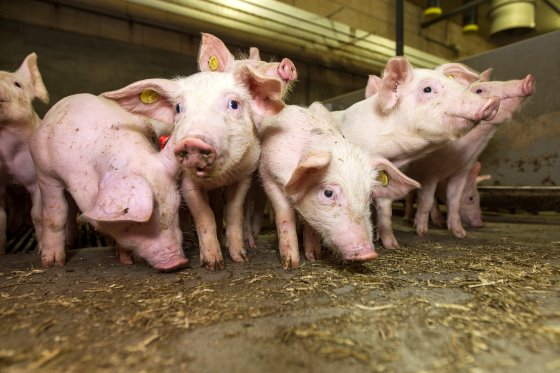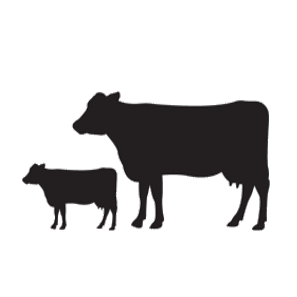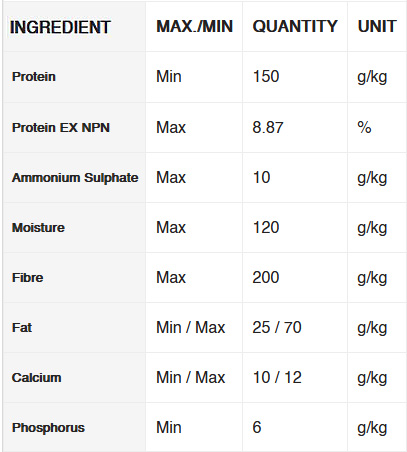The trace element zinc is being used in various ways in pig feed – both as an essential nutrition component but also, at pharmacological levels, to suppress scouring. This article aims to identify six different modes of actions of zinc for pigs. Trace minerals provide essential nutrients required for various metabolic functions such as growth, development, reproduction and immunity. Even moderate deficiency can adversely affect the animal performance.
Zinc is a trace element involved in various biological functions. It is a very important multifunctional element required for pig health, production and reproduction. Zinc is required for synthesis and metabolic functioning of nearly about 300 biochemical enzymes and is considered essential for cell division and synthesis of DNA and protein synthesis. Besides, zinc is not widely stored in the body and requires a continuous supply along with the diet specially in pigs as pig diets are mainly composed of cereals, which contain high amounts of phytase. This in turn binds with zinc and forms insoluble mineral chelates that are not able to absorbed in the intestine.

Supplementation of zinc at a pharmacological dose in the form of zinc oxide is practised in nursery pigs, helping to decrease the incidence of post-weaning scouring. Photo: Ronald Hissink
The presence of higher quantities of other inorganic elements like iron, copper and calcium also block the absorption of zinc in the intestine. Recent studies suggest that zinc may be applied at pharmacological doses to reduce the stress of weaning. As weaning of piglets is the period of transition from maternal milk and dependency on the sow, to a physically and chemically different diet as well as different feeding regime and environmental stress which are responsible for profound changes in the gastro-intestinal tract of the piglets.
Nowadays supplementation of zinc at a pharmacological dose (2,000-3,000 ppm) in the form of zinc oxide is practised in nursery pigs, which helps decrease the incidence of post-weaning scouring, increase average daily body weight gain and also develops better disease resistance capacity.
Zinc in the biological system
Zinc is a structural component of a great number of proteins, including enzymes of cellular signalling pathways, and transcription factors. Zinc can modulate cellular signal recognition, second messenger metabolism, protein kinase, and protein phosphatase activities. In addition to calcium, phosphorus and magnesium, zinc is also important for bone formation as the study revealed that deficiency of zinc reduces the size and strength of the femur bone. It is essential for cell proliferation and differentiation, especially for the regulation of DNA synthesis and mitosis. Zinc plays a vital role in maintenance of genomic stability, genetic expression, apoptosis modulation. Zinc is an integral part of DNA repair protein OGG1 which repairs oxidised guanine in DNA. Its dysregulation leads to point mutations and down regulation in gene expression.
6 modes of action can be distinguished in pigs.
 Zinc and the gastro-intestinal tract Zinc and the gastro-intestinal tract
Zinc is associated with the maintenance or function gastrointestinal tract from taste buds of the tongue to the function of villus and crypt in the intestine. In intestinal tract, for instance, zinc helps maintain the stability of the intestinal microflora, to support a large diversity of coliforms in weaned piglets, and to reduce the susceptibility of pigs to E. coli infection. Further study has also reported that supplementation of pharmacological doses of zinc as zinc oxide act as an antimicrobial agent and improves the gastrointestinal tract function by increasing mucosal thickness, villi height, and width of the small intestine.
 Zinc and enzyme activity Zinc and enzyme activity
The enzyme copper/zinc superoxide dismutase (Cu/Zn SOD) has a vital role in normal body functions. In mammalian tissues, reactive oxygen species, such as superoxide radicals, hydroxyl radicals and hydrogen peroxide are continuously generated during aerobic metabolism. Excessive generation of reactive oxygen species can cause detrimental changes. Therefore these free radicals should be elemented from the body. Among the other enzymes that detoxify the free radicals, Cu/Zn SOD is one the most important enzyme that catalyses the elimination of free radicals.
 Zinc and metabolic hormone activity Zinc and metabolic hormone activity
A normal thyroid status is dependent on the presence of many trace elements for both the synthesis and metabolism of thyroid hormones. The role of zinc in thyroid metabolism has been investigated in animals but with conflicting results. Recent findings in 2014 indicated a higher and lower, tri-iodothyronine and thyroxin concentration in zinc supplemented and zinc deficient pigs.
 Zinc and growth Zinc and growth
Dietary zinc enhances growth in livestock by activating the various enzyme systems that are essential for cell division and proliferation.
 Zinc and pig reproduction Zinc and pig reproduction
In case of male animals, zinc plays an important role in spermatogenesis. Reports have indicated that in zinc-deficient animals, Leydig cell development may be retarded and the response to luteinising hormone (LH) as well as testicular steroidogenesis reduced.
In sows, the control of zinc on oestrus behaviour, length of oestrus cycle and age at puberty is well described. However, zinc also plays a role in reproductive problems in animals – delayed puberty and lower conception rates, failure of implantation and reduction of litter size are also reported. Zinc has a significant role in repair and maintenance of uterine lining following parturition and early return of post-partum oestrus. Zinc deficient animals have been shown to have lower concentrations of follicle-stimulating hormone (FSH) and LH.
 Zinc and the immune system Zinc and the immune system
Zinc plays a very important role in controlling the immune system, and zinc-deficient animals experience increased susceptibility to a variety of pathogens. Zinc affects multiple aspects of the immune system, from the barrier of the skin to gene regulation within lymphocytes. Zinc is crucial for normal development and function of cells mediating non- specific immunity such as neutrophils and natural killer cells. Zinc deficiency also affects development of acquired immunity by preventing both the outgrowth and certain functions of T lymphocytes such as activation of Th1 cytokine production, and B lymphocytes. |
References available on request.
















